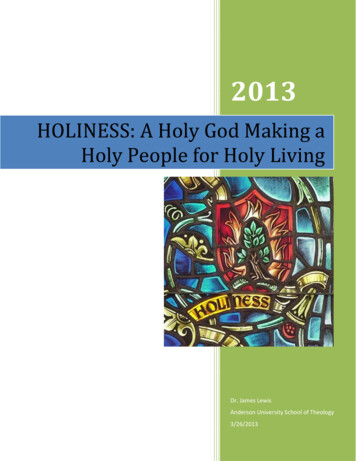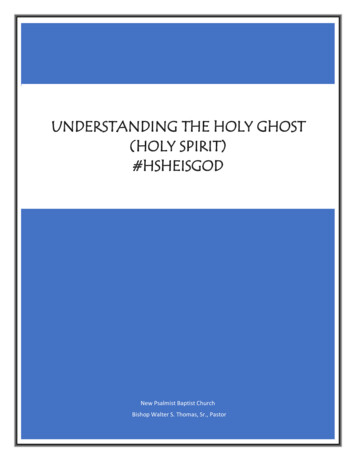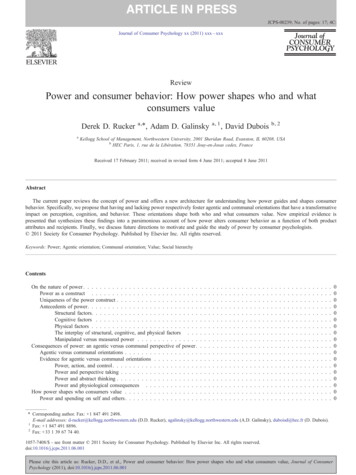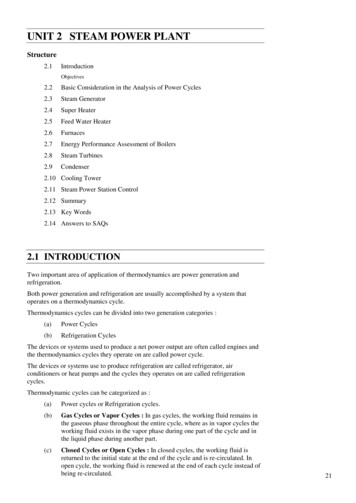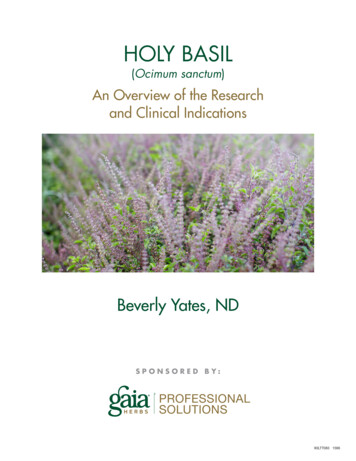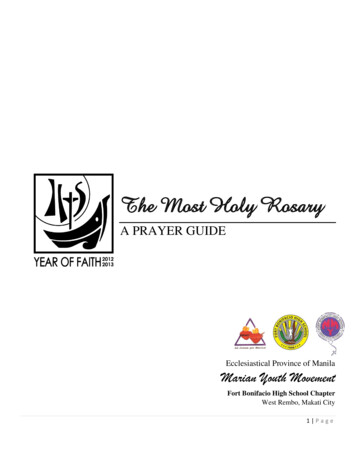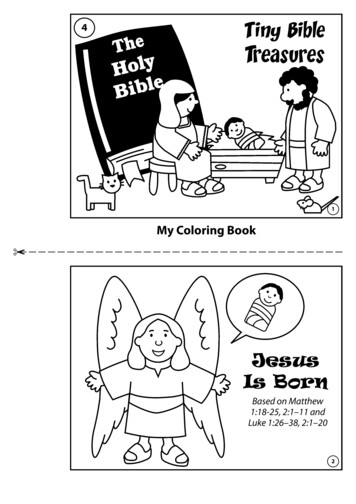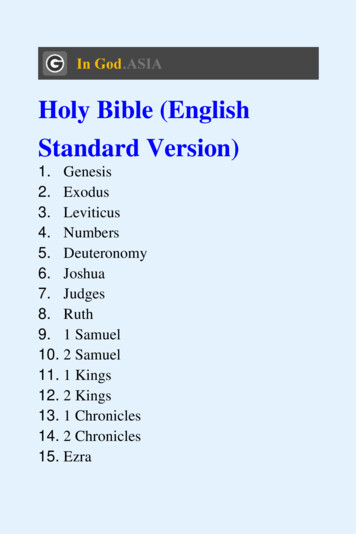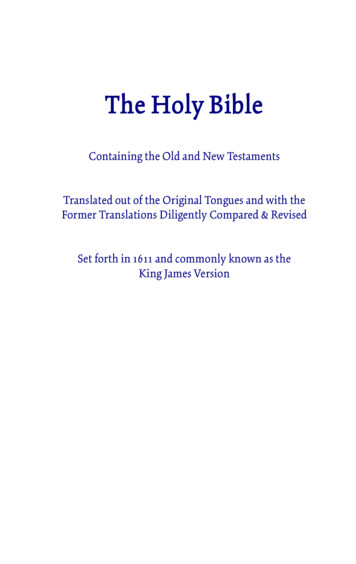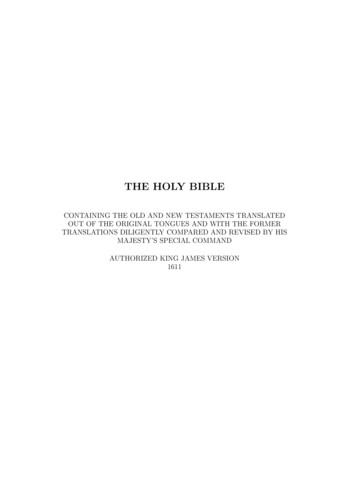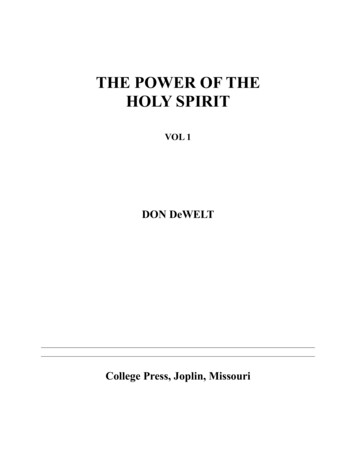
Transcription
THE POWER OF THEHOLY SPIRITVOL 1DON DeWELTCollege Press, Joplin, Missouri
Copyright 1963 A88206Don DeWeltFirst Printing—May 1963Second Printing—October 1966Third Printing—August 1970Fourth Printing—August 1971Fifth Printing—December 1972Sixth Printing—September 1973Seventh Printing—August 1976Eighth Printing—March 1979Ninth Printing—August 1984Tenth Printing—September 1991College PressP.O. Box 1132Joplin, Missouri 64801International Standard Book Number: 0-89900-123-8DEDICATIONTo W. L. Jessup whose life to me has manifested the fruit of the Holy Spirit—2
INTRODUCTIONWe propose a thorough study of the subject of the Holy Spirit, i.e. a consideration of every reference inthe Bible on the subject. Whereas this will be a thorough study it shall also be very practical and personal.We shall study the subject in thirteen lessons as follows:1. Who is the Holy Spirit?2. Do all Christians possess the Holy Spirit?3. How can the Holy Spirit help me?4. Should I be baptized in the Holy Spirit?5. Should I speak in tongues?6. How can I be filled with the Holy Spirit?7. How can I have the fruit of the Spirit?8. Can the Holy Spirit help me to overcome sin?9. How did the Holy Spirit help Christ? Is this an example for me?10. How did the Holy Spirit inspire the writers of the Bible?11. How can I be led of the Holy Spirit?12. What about the Holy Spirit in the Old Testament?13. What is the blasphemy of the Holy Spirit?3
BIBLIOGRAPHYFor the benefit of those who wish a bibliography of the subject, we offer the following list: (we do notby any means recommend all these books—we feel, however, one should be acquainted with the effortsof others in the same area of study)—(1) The Promise of the Spirit, Win. Barclay, Westminster Press, 1960 ( 2.50) 120 pp.(2) The Christian Experience of the Holy Spirit, H. Wheeler Robinson, Harper & Bros., 1952 ( 4.00) 295pp.(3) The Holy Spirit and the Human Mind, Ashley S. Johnson, Old Paths Book Club, 1952 ( 3.50) 290 pp.(4) The Holy Spirit, H. Leo Boles, Gospel Advocate Co., 1942 ( 3.95) 313 pp.(5) .4 Scriptural View of the Office of the Holy Spirit, R. Richardson, Christian Publishing Co., 1872, 324PP.(6) The Spirit and the Word, Z. T. Sweeney, Gospel Advocate Co., 1875 ( 2.00) 140 PP.(7) The Baptizing Work of the Holy Spirit, Merrill F. Unger, Scripture Press, 1953 ( 2.00) 147 PP.(8) The Nativity of the Holy Spirit, Arthur T. O’Rear, Pentecostal Publishing Co., 1929, 188 PP.(9) A Help to the Study of the Holy Spirit, Win. Edward Biederwolf, Fleming H. Revell Co., 1903, 222PP.(10) The Holy Spirit in Your Life, Andrew W. Blackwood, Jr., Baker Book House, 1957 ( 2.50) 169 pp.(11) All With One Accord, Donald Gee, Gospel Publishing Co., 1961 (60c) 61 PP.(12) Pentecostal Truth (correspondence course) Vol. I & II, Myer Pearlmen and Frank M. Boyd,Assemblies of God. 1948 ( 30.00) (63 pp. Vol. I, 62 pp., Vol. II)(13) The Power of Pentecost, John R. Rice, Sword of the Lord. 1949 ( 3.95) 441 Pp.(14) The Holy Spirit, His Off ice And His Work,, 0. L. Mankamyer, published by the author, 1951, 127pp., 2.00.(15) The Holy Spirit, His Person and Work, Edward H. Bickersteth, Kregel, 1959, 2.95.(16) He That Is Spiritual, Lewis Sperry Chafer, Findlay, Ohio: Dunham, 1918, 2.75.(17) The Spirit, the Church and the Sacraments, J. G. Davies,London: Faith, 15s.(18) The Holy Spirit in the Life of Today, F. W. Dillistone, Westminster, 1947, 2.4
(19) The Mission and Ministration of the Holy Spirit, Arthur Cleveland Downer, Edinburgh: T. & T.Clark, 1909, 13s.(20) The Holy Spirit in Christian Theology, George S. Hendry, Westminster, 1956, 2.50.(21) The Quest for Holiness: a Biblical, Historical and Systematic Investigation, Adolf Koberle, tr. by J.C. Mattes, Augsburg, 1930, paper 1.25.(22) The Work of the Holy Spirit, Abraham Kuyper, tr. by Henri De Vries, Introduction by B. B.Warfield, Eerdmans, 1900, 5.(23) The Spirit of God, G. Campbell Morgan, Revel!, 1900, 2.75.(24) The Spirit of Christ, Andrew Murray, Zondervan, 3.50.(25) The Spirit of the Living God, Harold John Ockenga, Reveil, 1947, 2.(26) The Holy Spirit, His Gifts and Powers, John Owen, Kregel, 1954, 3.95.(27) The Person and Work of the Holy Spirit, René Pache, tr. by J. D. Emerson, Moody, 1954, 3.50.(28) The Holy Spirit of Promise; the Mission and Ministry of the Comforter, J. Oswald Sanders, FortWashington, Pa.: Christian Literature Crusade, 1959, 2.50.(29) With the Holy Spirit and With Fire, Samuel M. Shoemaker, Harper, 1960, 2.50.(30) The Holy Spirit, or, Power from On High, A. B. Simpson, 2 vols., Harrisburg, Pa.: ChristianPublications, 1924, 5.80.(31) The Doctrine of the Holy Spirit, George Smeaton, Christian Literature Crusade, 3.50.(32) The Holy Spirit of God, W. H. Griffith Thomas, 3rd ed., Eerdinans, 1955, 5.00.(33) The Holy Spirit: Who He Is and What He Does, R. A. Torrey, Revell, 1927, 3.(34) An Experimental and Practical View of the Work of the Holy Spirit, Octavius Winslow, London:Banner of Truth Trust, 3s.(35) I Believe in the Holy Spirit, Fredrik Wisloff, tr. by Ingvald Daehlin, Augsburg, 1949, 3.(36) The Witness of the Spirit, Bernard Ramm, Eerdmans, 1959, 3.00.(37) The Holy Spirit and the Holy Life, Chester K. Lehman, Herald Press, 1959, 3.50.5
COMMENTARIES(1) Thessalonians, Corinthians, Galatians, and Romans by J. W. McGarvey and Philip Y. Pendleton, TheStandard Pub!ishing Company, 1916, 3.75.(2) The First Epistle of Paul to the Corinthians by Leon Morris, Eerdmans, 1958, 3.(3) The Epistles of Paul by W. J. Conybeare, Baker, 1958, 2.50.(4) The interpretation of I and II Corinthians by R. C. H. Lenski, Augsburg Publishing House, 6.55.(5) Ca/tin’s New Testament Commentaries—The First Epistle of Paul to the Corinthians, Eerdmans,1960, 5.(6) Commentary on the First Epistle to the Corinthians, Vol. II, F. Godet, Zondervan, 1957, 5.95.(7) Barnes Notes Ofl the New Testament by Albert Barnes, Baker, 1954, 3.50.(8) The Pu/pit Commentary, edited by H. D. M. Spence and Joseph S. Excel!, Vol. 44, Funk & WagnallsCo.(9) Ellicott’s Commentary on the Whole Bible, Vol. VII, Zondevan, 1954, 5.95.(10) A Commentary on the Holy Scriptures by Peter Lange, Scribner’s Sons, 1915.6
TABLE OF CONTENTSDEDICATION2INTRODUCTION. 3TABLE OF CONTENTS . 7Lesson OneWHO IS THE HOLY SPIRIT? . 9Lesson TwoDO ALL CHRISTIANS POSSESS THE HOLY SPIRIT?. 13Lesson ThreeHOW CAN THE HOLY SPIRIT HELP ME? . 19Lesson FourSHOULD I BE BAPTIZED IN THE HOLY SPIRIT? . 27Lesson FiveSHOULD I SPEAK IN TONGUES? . 37WORD OF WISDOM AND KNOWLEDGE . 38FAITH . 38PROPHECY . 38DISCERNING OF SPIRITS. 39WORKING OF MIRACLES. 40HEALING . 41KINDS OF TONGUES . 42INTERPRETATION OF TONGUES. 49SPIRITUAL GIFTS 12:1—14:40. 49THE GREATEST THING IN THE WORLD . 61THE CONTRAST . 62THE ANALYSIS . 637
Lesson OneWHO IS THE HOLY SPIRIT?Questions you should answer before you study the lesson.1. Why is it important that we identify the Holy Spirit?Read the following references for some answers: Rom. 8:9; I Cor. 3:16; Eph. 4:30.2. Is the Holy Spirit a person?Read the following references for the answers: I Tim. 4:1; John 14:26; Acts 16:6,7.3. Is the Holy Spirit God?Read the following references for the answers: Heb. 9:14; I Cor. 2:10,11; Gen. 1:2.4. Where does the Holy Spirit live today?Read Rom. 8:9-17; I Cor. 6:19; Acts 2:38.5. How can we know more about the Holy Spirit? Read Eph. 6:17; Heb. 4:12; Eph. 5:18; Gal. 5:22.Lesson DiscussionJesus made a wonderful promise in John 14:16-17: “And I will pray the Father, and he shall give youanother comforter, that he may be with you forever, even the Spirit of truth whom the world cannotreceive; for it beholdeth him not, neither knoweth him: ye know him; for he abideth with you, and shallbe in you.” Please notice two or three plain points in this promise:(1) The Holy Spirit is another Helper or Comforter—Jesus was the first Helper or Comforter—inthe absence of Jesus the Holy Spirit was to be sent. He was in a sense to take the place ofJesus.(2) The Holy Spirit is to be with us for ever.(3) The Holy Spirit is not known or received by everyone—only those who are prepared for Him.(4) Because the apostles knew Jesus they knew the Holy Spirit—notice: “he abideth with you, andshall be in you.”Who was with them? Jesus was. Who was to be in them? The Holy Spirit was. But Jesus andthe Holy Spirit are so much alike that when the Holy Spirit came into them, He would indeedbe “Christ in them, the hope of glory” (Col. 1:27).In a very wonderful sense Jesus could have said, “He that hath seen me hath seen the Holy Spirit.”Jesus was not only the embodiment of the heavenly Father, but also of the heavenly Spirit.We wish to say just two things in this lesson about the Holy Spirit.First—He is a person.Second—He is divine.HE IS A PERSONWhat would you think of a person who kept referring to your son or daughter as “it.” This would beall right before birth when the sex is not known and the child is not identified—but after birth it isinexcusable—it would hurt the parents to hear their child called “it.”The Holy Spirit is grieved when we do not recognize Him as a person (Eph. 4:30). The constant useof such expressions as:“I need more of it,” or “it ought to be studied more” or “It is a great source of power,” is indicativeof a lack of knowledge.These expressions belie our ignorance. The Holy Spirit is a person in the same sense that JesusChrist our Lord is a person: in the same sense that God is a person. These three are divine persons, butpersons nonetheless.
THE POWER OF THE HOLY SPIRITPlease notice:(1) A person has the power of speech—the Holy Spirit speaks: I Tim. 4:1, “The Spirit sayethexpress/y “ Cf. Acts 8:29.(2) A person has the power to decide—or exercises the will through the mind. The Holy Spirit hasthe power of choice: having been forbidden of the Holy Spirit” (Acts 16:6,7). The Holy Spirithas a mind: and he that searcheth the hearts knowetb what is the mind of the Spirit’ (Romans8:27).(3) A person has the ability to teach. The Holy Spirit teaches: “But the Comforter (Counselor,Helper, Intercessor, Strengthener, Advocate, Standby) even the Holy Spirit, whom the Fatherwill send in my name, he shall teach you all things, and bring to your remembrance all that saidunto you.” John 14:26. Cf. I Cor. 2:13.(4) A person has the ability to testify or witness. The Holy Spirit testifies or witnesses: But whenthe Comforter is come, whom I will send unto you from the Father, even the Spirit of truth,which proceedeth from the Father, he shall bear witness of me.” John 15:26.(5) A person can lead others and forbid others, The Holy Spirit leads and forbids: ‘And they wentthrough the region of Phrygia and Galatia having been forbidden of the Holy Spirit to speak theword in Asia; and when they were come over against Mysia, they assayed to go into Bithyniaand the Spirit of Jesus suffered them not.” Acts 16:6,7.(6) We always use the personal pronoun when referring to a person. Personal pronouns in themasculine gender are applied to the Holy Spirit. This is true even in face of the fact that thenoun “Spirit” which is neuter, should have all of its pronouns and modifiers in the neuter:“Howbeit when he, the Spirit of truth, is come, he shall guide you into all the truth: for he shallnot speak from himself,’ but what things soever he shall hear, these shall he speak: and he shalldeclare unto you the things that are to come. John 16:13. Cf. John 15:26; 16:7,8.Answer These QuestionsDo this by reading the references indicated. (Please do not overlook this—we all want to know moreof our wonderful unseen guest.)1. What capacity of the Holy Spirit is indicated in Romans 15:30?2. Read Isa. 63:10 and Eph. 4:30 and indicate yet another characteristic of the Holy Spirit.3. Two church members found out that the Holy Spirit was a very real person—read Acts 5:3. Whatquality of the Holy Spirit is here indicated?4. Hebrews 10:29 tells of a fearful sin against the Holy Spirit; What is it?5. Would it be possible to resist the Holy Spirit? Read Acts 7:51 and apply it to today and our lives.We have learned from our study thus far: “The Holy Spirit is not a mere impersonal force orinfluence which we somehow get hold of and use; but He is a personal being, wise and holy, who is to gethold of us and use us. He is one with whom we may have the closest friendship, or fellowship. We saywith Paul: ‘If there is therefore any exhortation in Christ, if any consolation of love, if any fellowship ofthe Spirit,’ . . . Col. 2:1. Cf. II Cor. 13:14. “He enters into our personalities, and we become new persons,with renewed minds, affections, desires and wills.” (Seth Wilson)THE HOLY SPIRIT IS DIVINEGod is a divine being or person.Christ is a divine being or person.The Holy Spirit is a divine being or person.To deny the person or personality of the Holy Spirit is to deny His essential nature.To deny His deity is to deny God.What is it that makes God what He is? i.e., what are the essential identifying qualities of God? Herethey are:(1) God is eternal: Psa. 90:2. The Holy Spirit is eternal: “how much more shall the blood of Christ,who through the eternal Spirit offered himself without blemish unto God,.” Heb. 9:14. Cf.10
WHO IS THE HOLY SPIRIT?Gen. 1:2.(2) God is omniscient or all-wise: Job 32:8 The Holy Spirit is omniscient:“For who among men knoweth the things of a man, save the spirit of the man which is in him?Even so the things of God none knoweth, save the Spirit of God.” I Cor. 2:11.(3) God is omnipotent or all-powerful: Gen. 18:14. The Holy Spirit is omnipotent: “And my speechand my preaching were not in persuasive words of wisdom, but in demonstration of the Spiritand of power: that your faith should not stand in the wisdom of men, but in the Power of God.”I Cor. 2:4,5. Cf. Luke 1:35; Acts 1:8; Micah 3:8.(4) God is omnipresent or everywhere present: I Kings 8:27. The Holy Spirit is omnipresent:“Whither shall 1 go from thy Spirit? Or whither shall I flee from thy presence? If I ascend upinto heaven, thou are there. If I make my bed in Sheol, behold, thou art there. If I take thewings of morning, and dwell in the uttermost parts of the sea; even there shall they hand leadme, and thy right hand shall hold me.” Psa. 139:7-10.(5) God is holy—God is truth—God is grace—God is wisdom: The Holy Spirit is called:a. “Holy”—.Eph. 4:30.b. “The Spirit of truth.” John 14:17.c. “The Spirit of grace.” Heb. 10:29.d. “The Spirit of wisdom.” Isa. 11:2.The Holy Spirit is called God: read Acts 5:1-3.Answer These Questions(In answering these questions you will be reading the word of the Spirit—this is what the Holy Spirithas said about Himself.)1. According to Gen. 1:2; Job 33:4; Psa. 104:30; the Holy Spirit had a definite part in the creation of theworld. What was it?2. What quality of God is found in the Holy Spirit according to the following references: Gen. 2:7; Rom.8:11; John 6:63; John 3:5?3. The prophets were spokesmen for God, but who gave them their message? Read II Peter 1:21. Howdoes this reference point up the deity of the Holy Spirit?4. Jesus said, “But if I by the Spirit of God cast out demons, then is the kingdom of God come upon you.”Matt. 12:28. How does this reference indicate the deity of the Holy Spirit? Cf. I Cor. 12:9,11. Theworks of the Holy Spirit are the works of God. The inspired writers placed the Father, the Son, and theHoly Spirit on an equal level. Please read Matt. 28:19; II Cor. 13:14.The Holy Spirit is a divine personality.11
THE POWER OF THE HOLY SPIRITExamination over Lesson One1. How was it possible for Jesus to say, “He that hath seen me hath seen the Holy Spirit”? (He did notsay this, but it was possible—explain why.)2. Why is it wrong to refer to the Holy Spirit as “it”?3. Specify a time and place when the Holy Spirit spoke.4. Give three characteristics of a person ascribed to the Holy Spirit.5. Mention two indications of the sensibilities of the Holy Spirit.6. We are not to “get hold of the Holy Spirit and use Him’ what is to take place?7. What is to happen to us when the Holy Spirit enters our personalities?8. Give three qualities of God found in the Holy Spirit.9. What were the two basic thoughts of this lesson?10. Is this divine being in the world today? Where?12
Lesson TwoDO ALL CHRISTIANS POSSESS THE HOLY SPIRIT?Questions you should answer before you study this lesson.1. “Did you receive the Holy Spirit when you believed?” Please read Acts 19:1-6; Acts 8:12-15; and Gal.3:2 for an answer.2. If you have the Holy Spirit, of what value is He to you? Read:John 7:38,39; Rom. 8:12-17; Rom. 14:17.3. The Christian is commanded to:(1) “Walk by the Spirit.” Gal. 5:16; 25.(2) “Quench not the Spirit.” I Thess. 5:19.(3) “Grieve not the Holy Spirit.” Eph. 4:30.How shall we know when we are, or are not obedient to these important commands?4. If we are not “born of the Spirit” (John 3:5) we are not born again.If we “Have not the Spirit of Christ we are none of His.” Romans 8:9,10.At the same time we were washed in the bath of regeneration we were renewed by the Holy Spirit.Titus 3:5.Are these mere theological expressions or a personal reality? Please discuss.5. If our bodies are the temple of the Holy Spirit (and they are, read I Cot. 6:19,20), how shall we knowthis to be true? What shall we do about it?Lesson DiscussionWe have but a single purpose in this lesson: to emphasize the Scriptural truth that every Christian hasa gift from God—the person of the Holy Spirit indwelling his body.We shall approach this purpose in a series of important questions and answers:1. When is the Holy Spirit given?Answer: When we have repented and have been baptized: Repent ye, and be baptized every one of youin the name of Jesus Christ unto the remission of your sins; and ye shall receive the gift of theHoly Spirit.” Acts 2:38.This is not a gift from the Holy Spirit, but rather the gift of the Holy Spirit Himself. God gives a giftto all who repent and are baptized; this gift is the Holy Spirit.Please notice that the text does not say we receive a part of the Holy Spirit, or a measure of the HolySpirit, or a manifestation of the Holy Spirit. We receive at our obedience a gift from God—this gift is theHoly Spirit Himself.The Holy Spirit is a divine person—this divine person we obtain as a gift from God upon repentanceand baptism. We are not now saying anything about the activity of the Holy Spirit within us—we wish toemphasize the single truth that we have the Holy Spirit. This is true not because we have some emotionalsensation, but because God’s Word plainly so indicates.We are told in I Thess. 5:23 that man is a divine being possessed of spirit, soul, and body. It ispossible to identify our bodies, but what of our souls and spirits? Shall we say we have no spirit or soulbecause we have no emotional reaction to indicate their existence? We know God has said it and webelieve it.We are not here discussing the work of the Holy Spirit within man, nor are we discussing Hisactivity through man. Our single point now is the reception of the Holy Spirit. When and where do wereceive the Holy Spirit? Acts 2:38 plainly states upon repentance and baptism we receive a gift from Godwhich is the Holy Spirit.
THE POWER OF THE HOLY SPIRITActs 19:1-6 is a good comparative reference on this one point: “And it came to pass, that, whileApollos was at Corinth, Paul having passed through the upper country came to Ephesus, and foundcertain disciples: and he said unto them “Did you receive the Holy Spirit when you believed?” (The word“believed” was inclusive of all they did to accept Christ as their Lord and Saviour. According to Peter inActs 2:38 it included repentance and baptism. Paul also so taught: (Rom. 6:1-4; Gal. 3:27; Col. 2:23). Atthe time of their acceptance of Christ they should have received the Holy Spirit. Paul found here inEphesus a group of disciples very much in need of not only the Holy Spirit, but of salvation in Christ. Inresponse to Paul’s question these twelve disciples said, “Nay, we did not so much as hear whether theHoly Spirit was given.” Upon such an answer Paul inquired into the action of where and when the HolySpirit was given—”And he said, into what, then, were ye baptized?” And they said, into John’s baptism.And Paul said John baptized with the baptism of repentance, saying unto the people that they shouldbelieve on Him that should come after him, that is, on Jesus. And when they heard this they werebaptized into the name of the Lord Jesus.” Why were these disciples baptized into the name of the LordJesus? Because they lacked the Holy Spirit and Christian baptism is where and when we obtain the HolySpirit as a gift. Upon receiving the Holy Spirit, Paul laid his hands upon these persons so as to grant tothem certain miraculous powers through the Holy Spirit within them. We are not here discussing theabilities of speaking in tongues or prophesying. We wish only to point out that Christian baptism is thetime and place of the reception of the Holy Spirit.The final reference on this point is Acts 8:14-17: “Now when the apostles that were at Jerusalemheard that Samaria had received the word of God, they sent unto them Peter and John: who, when theywere come down, prayed for them, that they might receive the Holy Spirit: for as yet it was fallen uponnone of them: only they had been baptized into the name of the Lord Jesus. Then laid they their hands onthem, and they received the Holy Spirit.”Please notice that the text indicates a definite connection between the Holy Spirit and baptism. Whatis this connection? It is simply, that they had received the Holy Spirit in baptism, but not in Hismiraculous powers. Peter and John came that the Holy Spirit might “fall on them.” Prior to the comingof Peter and John the only relationship these Samaritans sustained to the Holy Spirit was found in theirbaptism. What was this relationship? The obvious conclusion is that they had received the Holy Spirit inbaptism, but not with miraculous powers. The prayer and laying on of hands by Peter and John providedthe “falling upon,” or the exercising of special powers of the Holy Spirit—baptism provided for Hispresence—Peter and John provided for His miraculous powers.2. Where does the Holy Spirit live?Answer: In the body of every Christian.This is plainly taught in the following references: “But if the Spirit of him that raised up Jesus fromthe dead dwelleth in you, he that raised up Christ Jesus from the dead shall give life also to your mortalbodies through his Spirit that dwelleth in you.” (Romans 8:11)Twice it is asserted in no uncertain terms that the Holy Spirit lives in the body of the Christian. Webelieve this because it is so stated in the Scripture-not because we can explain how it is possible. The bestattempted explanation as to how it is possible for the Holy Spirit to live in our bodies is found in thethought that it is possible in the same way that it is possible for our own human spirit to live in our bodies.“Or know ye not that your body is a temple of the Holy Spirit which is in you, which ye have fromGod? and ye are not your own?” I Cor. 6:19.How is it possible for the Holy Spirit to dwell in a thousand places at one time? Is this not acontradiction of the unity of His being or nature? Since we know nothing of the essential nature of theHoly Spirit other than the fact that He is a spiritual being like God, we have no answer. What we doknow is the plain statement of fact that He considers the body of man as His sanctuary and resides there.“in whom ye also are builded together for a habitation of God in the Spirit.” Eph. 2:22.In many places the New Testament states that God dwells in us—in this reference we learn how thisis possible—God dwells in us in the person of the Holy Spirit.I John 3:24 states in very plain words that God dwells in us through the Holy Spirit. Notice: “And hethat keepeth his commandments abideth in him, and he in him. And hereby we know that he abideth inus, by the Spirit which he gave us.”14
DO ALL CHRISTIANS POSSESS THE HOLY SPIRIT?I John 4:13 should also be read in this connection.One more reference in answer to this question: “Therefore he that rejecteth, rejecteth not man, butGod, who giveth his Holy Spirit unto you.” I Thess. 4:8.God has given the Holy Spirit to every Christian as a gift. The Holy Spirit is given to the Christianupon his obedience in Christian baptism. (Acts 5:32.) The Holy Spirit lives in the Christian’s body as Histemple.3. In What sense is the Christian “born of the Holy Spirit”?Answer: We believe the discussion of this question by Warren E. Bell in his tract, How Can a ManBe Born Again? is so well stated that we reproduce it here for your edification.“Now there was a man of the Pharisees, named Nicodemus, a ruler of the Jews: the same came untohim by night, and said to him, Rabbi, we know that thou art a teacher come from God; for no one can dothese signs that thou doest, except God be with him. Jesus answered and said unto him, Verily, verily, Isay unto thee, Except one be born anew, he cannot see the kingdom of God. Nicodemus saith unto him,How can a man be born when he is old? Can he enter a second time into his mother’s womb, and beborn? Jesus answered, verily, verily, I say unto thee, Except one be born of water and the Spirit, hecannot enter into the kingdom of God.” Jn. 3:1-5.Of all the Bible subjects of which one should be undoubtedly certain, this is it. Unless we have theright answer to this question, we “cannot enter” the kingdom of God.God planned both physical birth and the new birth. There is striking similarity between them.1.—THE BEGETTING OF NEW LIFEBefore a child can be born it must be generated or begotten by its father. The same is true of the newbirth. Before one can be born again he must be begotten again. This means there must be a life-causingseed to generate the new life. Is there such a seed?1. Lk. 8:5-8 records Jesus’ parable of the sower who “went forth to sow his seed.” Christ Himselfexplains the story. “Now the parable is this: the seed is the word of God.”2. “Having been begotten again, not of corruptible seed, but of incorruptible, through the word ofGod, which liveth and abideth.” I Pet. 1:23.3. “Of his own will he brought us forth by the word of truth.” Jas. 1:18.All of this means that the Holy Spirit inspired word is the life-causing seed that is planted in ourhearts. How true it is that “belief cometh of hearing and hearing by the word of Christ.” Rom. 10:17.You can know when you have been begotten again. “Whosoever believeth that Jesus is the Christ isbegotten of God.” I Jn. 5:1. The Greek word translated “begotten” is used of a father when he begets achild and of a mother when she gives birth to a child. When it refers to the father it is properly translated“to beget, generate”; when it refers to the mother it is translated “to bring forth, bear, give birth to.” Weare begotten of God, our Father.Let us remember that there has not been a birth! By the hearing of the word we have been caused tobelieve and thus begotten again. Without it there can be no birth, but the begetting a/one is not the newbirth.11.—THE EVIDENCE OF NEW LIFEIn physical generation, soon after the begetting, but before the birth, certain evidences of life takeplace. The new life that has been begotten makes itself known. Even so, the new life caused by the wordof the Spirit becomes evident. The new life on the inside is seen by a new behavior on the outside. Thischange is called repentance. The spiritually begotten person stops the practice of all known sin. Hemakes a complete turn in his life and begins to live to please Christ.1. “Whosoever is begotten of God doeth no sin, because his seed abideth in him: and he cannot sin,because he is begotten of God.” I Jn. 3:9.This does not teach sinless perfection. These action words refer to continuous action. The one trulybegotten of God does not deliberately
by any means recommend all these books—we feel, however, one should be acquainted with the efforts of others in the same area of study)— (1) The Promise of the Spirit, Win. Barclay, Westminster Press, 1960 ( 2.50)
